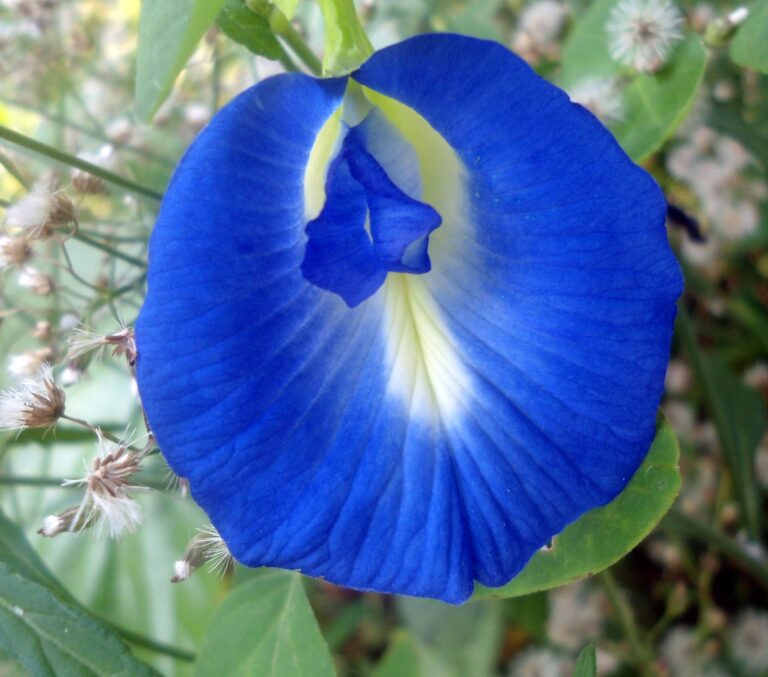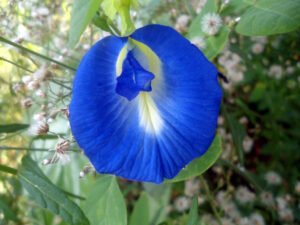Introduction to Aprajita Phool
Aprajita Phool, also known as Clitoria Ternatea or Butterfly Pea Flower, is a vibrant blue flower native to Southeast Asia. It has been used for centuries in traditional medicine, cooking, and beauty rituals. In recent years, it has gained popularity in the West for its numerous health benefits and stunning natural color.
In this blog, we’ll explore everything you need to know about Aprajita Phool, including its benefits, uses, and how to grow it at home. Whether you’re a health enthusiast, gardener, or beauty lover, this guide has something for you.
1. The Wonders of Aprajita Phool: Benefits, Uses, and Health Advantages
1.1 Origins and Botanical Overview
Aprajita Phool, derived from the Greek word “Clitoris,” boasts a rich history steeped in traditional medicine practices. Botanically, it belongs to the Fabaceae family and is characterized by its vibrant blue petals.
2. Health Benefits of Aprajita Phool
2.1 Cognitive Enhancement
Aprajita is renowned for its cognitive-enhancing properties attributed to its flavonoid and anthocyanin content. These compounds exert neuroprotective effects, promoting cognitive function and memory retention.
2.2 Antioxidant Properties
Rich in antioxidants, Aprajita Phool helps combat oxidative stress, thereby reducing the risk of chronic diseases such as cardiovascular disorders and certain types of cancer.
2.3 Stress Relief
The anxiolytic properties of Aprajita Phool make it a valuable asset in stress management. By modulating neurotransmitter levels and promoting relaxation, it aids in alleviating anxiety and improving overall mental well-being.
2.4 Anti-inflammatory Effects
Aprajita or Clitoria ternatea exhibits potent anti-inflammatory properties, attributed to its flavonoid composition. This makes it effective in reducing inflammation associated with conditions like arthritis and inflammatory bowel diseases.
3. Culinary and Beverage Uses
3.1 Herbal Teas and Infusions
Its vibrant hue and mild earthy flavor to herbal teas and infusions offers a visually appealing and nutritious beverage option.
3.2 Culinary Dishes and Desserts
In culinary applications, it serves as a natural food coloring agent, enhancing the aesthetic appeal of dishes and desserts while imparting subtle floral notes.
4. Incorporating Aprajita Phool in Religious Practices
4.1 Symbolism and Significance
In Hinduism, Aprajita or Clitoria ternatea symbolizes purity and spirituality, often used in religious ceremonies and rituals as offerings to deities.
4.2 Ritualistic Offerings
Devotees offer Aprajita Phool garlands and petals in temples and during religious festivals to invoke blessings and divine favor.
5. Potential Drawbacks and Precautions
5.1 Allergic Reactions
Individuals with known allergies to legumes or similar plants may experience allergic reactions upon consumption of Aprajita Phool.
5.2 Interaction with Medications
Aprajita Phool may interact with certain medications, particularly those affecting blood sugar levels or blood pressure. It is advisable to consult a healthcare professional before incorporating it into your regimen.
Health Benefits of Aprajita Phool
1. Rich in Antioxidants
Aprajita Phool is packed with antioxidants, which help combat free radicals and reduce oxidative stress. This makes it a great addition to your diet for overall health and longevity.
Example: Drinking Aprajita Phool tea daily can boost your antioxidant intake and improve skin health.
2. Improves Brain Health
The flower contains compounds that may enhance cognitive function and memory. It’s often used in Ayurveda to support brain health.
Example: Add Aprajita Phool powder to your smoothies for a brain-boosting drink.
3. Supports Weight Loss
Aprajita Phool is low in calories and can help improve digestion, making it a great addition to weight loss diets.
Example: Replace sugary drinks with Aprajita Phool tea to reduce calorie intake.
How to Use Aprajita Phool
1. Aprajita Phool Tea
One of the most popular ways to use Aprajita Phool is by brewing it into tea. The tea has a mild, earthy flavor and a stunning blue color that changes to purple when lemon is added.
Recipe:
- Steep 5-6 dried Aprajita Phool flowers in hot water for 5 minutes.
- Add honey or lemon for taste.
2. Aprajita Phool Smoothies
Add Aprajita Phool powder to your smoothies for a nutrient-packed drink.
Recipe:
- Blend 1 teaspoon of Aprajita Phool powder with banana, spinach, and almond milk.
3. DIY Beauty Treatments
Aprajita Phool can be used in homemade face masks, hair oils, and toners.
Example: Mix Aprajita Phool powder with coconut oil for a nourishing hair mask.
6. FAQs (Frequently Asked Questions)
1. Is Aprajita Phool safe for daily use?
Yes, Aprajita Phool is generally safe for daily use in moderate amounts. However, consult a doctor if you have specific health conditions.
2. Can Aprajita Phool help with anxiety?
Yes, its calming properties may help reduce stress and anxiety.
3. How much Aprajita Phool tea should I drink daily?
1-2 cups per day is recommended for most people.
4. Are there any side effects of Aprajita Phool?
Excessive consumption may cause digestive issues. Always use it in moderation.
5. Can Aprajita Phool be used during pregnancy?
Consult your doctor before using Aprajita Phool during pregnancy.
Conclusion
Aprajita Phool,is a versatile and beneficial plant that can enhance your health, beauty, and gardening experience. From its antioxidant-rich tea to its stunning blue flowers, this plant is a must-have for anyone looking to explore natural remedies.
Start your Aprajita Phool journey today by growing it at home or trying out its many uses. With its numerous benefits and easy cultivation, it’s no wonder this flower is gaining popularity worldwide.

